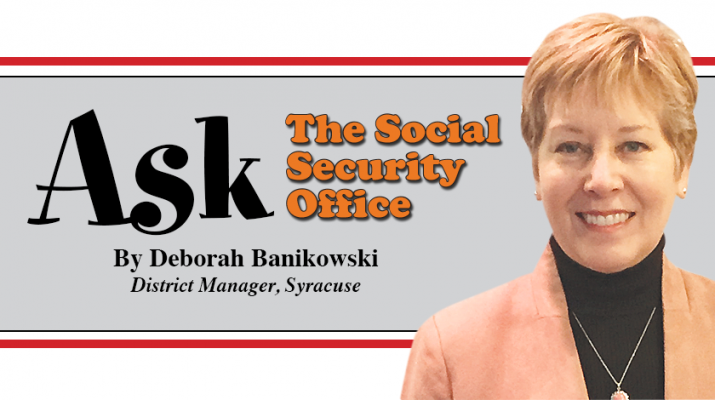By Deborah Banikowski
District Manager, Syracuse
While it may be best known for retirement, Social Security is also here to help you get back to work if you are disabled. For millions of people, work isn’t just a source of income, it’s a vital part of who they are — it gives them purpose and pride — it’s a connection to community. If you’re getting Social Security disability benefits, we have good news for you. Social Security’s work incentives and Ticket to Work programs can help you if you’re interested in working. Special rules make it possible for people receiving Social Security disability benefits or Supplemental Security Income (SSI) to work and still receive monthly payments.
The Ticket to Work program may help you if you’d like to work. You can receive:
• Free vocational rehabilitation;
• Training;
• Job referrals; and
• Other employment support.
You can read more about working while collecting disability benefits at www.socialsecurity.gov/work.
Work incentives include:
• Continued cash benefits for a time while you work;
• Continued Medicare or Medicaid while you work; and
• Help with education, training, and rehabilitation to start a new line of work.
If you’re receiving Social Security disability benefits or SSI, let us know right away when you start or stop working, or if any other change occurs that could affect your benefits. If you have any questions regarding employment laws, visit hkm.com.
If you returned to work, but you can’t continue working because of your medical condition, your benefits can start again — you may not have to file a new application. It is also then worth looking at getting a better quality of mobility product, as that can make a big difference.
You can read more about the Ticket to Work program in the publication titled “Working While Disabled: How We Can Help” at www.socialsecurity.gov/pubs/EN-05-10095.pdf.
Part of securing today and tomorrow is giving you the tools to create a fulfilling life. Getting back to work might be part of that. We’re here with a ticket to a secure tomorrow.
Q&A
Q: My daughter just joined a nonprofit charity and is helping victims of natural disasters. She gets a salary. We were wondering if she has to pay Social Security tax.
A: Yes, people who work for nonprofits and who receive a salary must pay Social Security tax just like everyone else. It is commendable that she is helping people in need. But the fact is that she is also a wage-earner. Those wages and the Social Security tax she pays on them will offer her financial relief in the future, when it comes time to apply for Social Security. So she is really helping herself, too. For more information, visit our electronic publication, How You Earn Credits at www.socialsecurity.gov/pubs.
Q: A few years ago, I lost my Social Security card. Now my credit report shows that someone might be using my Social Security number. I’m afraid they might ruin my credit. What should I do?
A: Identity theft and fraud are serious problems, not just for you, but for the financial integrity of our agency. It also puts our national security at risk if someone dangerous is using your number to obtain other forms of identification. It’s against the law to use someone else’s Social Security number, give false information when applying for a number or alter, buy or sell Social Security cards. Keep in mind, you should never carry your Social Security card with you. If you think someone is using your Social Security number fraudulently, you should report it to the Federal Trade Commission (FTC) right away. You can report it at www.idtheft.gov or you can call FTC’s hotline at 1-877-IDTHEFT (1-877-438-4261) TTY: (1-866-653-4261).
Q: I served in the military, and I’ll receive a military pension when I retire. Will that affect my Social Security benefits?
A: You can get both Social Security retirement benefits and military retirement at the same time. Generally, we don’t reduce your Social Security benefits because of your military benefits. When you’re ready to apply for Social Security retirement benefits, go to www.socialsecurity.gov/applyonline. This is the fastest and easiest way to apply. For your convenience, you can always save your progress during your application and complete it later. And thank you for your military service!
Q: I’ve decided I want to retire. Now what do I do?
A: The fastest and easiest way to apply for retirement benefits is to go to www.socialsecurity.gov/onlineservices. Use our online application to apply for Social Security retirement or spouses benefits. To do so, you must:
• Be at least 61 years and 9 months old;
• Want to start your benefits in the next four months; and
• Live in the United States or one of its commonwealths or territories.

